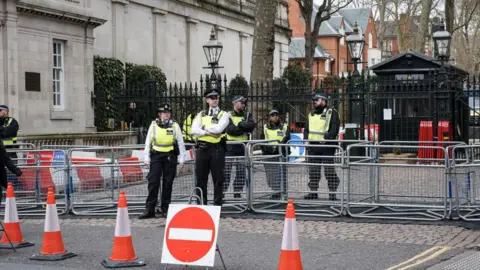The recent events surrounding the Israeli embassy in London have raised significant alarm and concern within both the local and international communities. According to reports by the BBC, five men, all believed to be Iranian nationals, have been apprehended under suspicion of plotting a terrorist act aimed at the Israeli diplomatic mission situated in Kensington. Although the Metropolitan Police have not officially confirmed that the embassy was indeed the target, sources indicate that this assertion is likely accurate. The developments have drawn considerable media attention, particularly given the ongoing tensions involving Iran and global perceptions of security threats.
The Metropolitan Police’s Commander, Dominic Murphy, who leads the counter-terrorism unit, characterized the situation as “fast-moving” and remarked on significant operational reasons that preclude the sharing of more detailed information at this stage. Such discretion is typical in sensitive security matters as authorities work to assess the full scope of the threat and manage public safety. The apprehended individuals include a mix of ages ranging from 24 to 46, and they were detained in various locations including Swindon, Stockport, Rochdale, and Manchester. Their arrests, executed on a Saturday, were apparently part of a carefully coordinated operation, given the multiple raid sites across England.
In response to these allegations, Iranian Foreign Minister Seyed Abbas Araghchi has categorically denied any involvement by Iran. He expressed willingness for the Iranian government to assist in the investigation while simultaneously questioning the veracity of the claims against the individuals, which adds another layer of complexity to the already fraught diplomatic relations between Iran and Western nations, particularly the United Kingdom.
The investigation has invoked significant public interest, especially because several armed police units were deployed to carry out the arrests. Eyewitness accounts noted scenes of apprehension, including footage showing police officers forcibly removing detainees from premises in Rochdale and Swindon, branding the event a significant response to perceived threats against national security. As the investigation unfolds, the Metropolitan Police are expected to share further updates, although they have urged the public to remain vigilant in the meantime.
The ongoing situation is notable for its implications in broader contexts of international relations and national security. Home Office Minister Dan Jarvis announced to the House of Commons that the arrests formed part of one of the largest counter-terrorism operations in recent history. This statement underscores the heightened sense of alert among British authorities regarding possible state-sponsored threats, especially given that a further three Iranian individuals faced arrest on the same day, in connection with an investigation led under the directives of the National Security Act 2023. This legislation empowers officers to detain individuals suspected of engaging in activities deemed as threats from foreign state actors.
As this investigation develops, it remains to be seen how it will affect diplomatic negotiations, particularly surrounding Iran’s nuclear ambitions and its relationships within the international community. It has already drawn concerns within the UK, as discussions of national security and public safety take center stage in political discourse. Moreover, as details emerge, the event may impact perceptions of Iranian nationals residing in or visiting the UK—who may face increased scrutiny due to the actions of a few.
The series of confrontational and investigative actions undertaken thus far highlight a tense atmosphere, where security and diplomacy intersect, compelling the public and authorities alike to navigate a complex terrain of suspicion, vigilance, and international law. The resonance of this incident is expected to reverberate through discussions on security policy and the intricacies of international relations moving forward.



